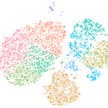Clinical Technoshot: Single-Cell Sequencing Program (SCS)

Francesco Nicassio
Clinical Technoshot Coordinator
Starting in 2018, DEO established top-down technology development projects aimed at boosting the dissemination of the know-how required to face the newest technological challenges in cancer research. The programs are funded for 12 months and subject to evaluation with the possibility of being renewed by the DEO faculty.
Program 1.0
In concomitance with the acquisition of the 10X Genomics microfluidic device and the increased power of the GU sequencing throughput (by Illumina NovaSeq 6000) that took place between 2017 and 2018, DEO decided to launch the first project in high-throughput Single Cell Transcriptomics with the goal of promoting the technological and computational know-how within the department. The program was opened to all PIs of DEO and was joined by eight different groups. It started in January 2018 and led to the generation of more than 800.000 single cell RNAseq profiles (around 220 runs) in different human and mouse model systems. A midterm (June 14th 2018) and a final (January 31st 2019) meeting were organized for the entire department with each participant group presenting and discussing their technical and computational achievements and bottlenecks.
Program 2.0
Based on the success registered by this pilot program and given the strong interest that the department has shown in the development of technological approaches suitable for the study of cellular heterogeneity, the DEO has decided to continue the Single Cell programs into 2019 while also expanding its scope. The Program 2.0 aims at the implementation of new Single Cell approaches, such as 1) a Single Cell DNA Sequencing that aims at establishing the analysis of DNA copy number variations (CMV) at a single cell level; 2) a Single Cell Epigenomics with the goal to generate ATACseq analysis at Single Cell level and develop analytical pipelines that can integrate transcription and epigenomic data at single cell level; 3) Single Cell featured RNAseq, for gene expression characterization at single cell resolution coupled with the Feature Barcoding technology that could be used to identify cell-specific CRISPR-mediated perturbations or to simultaneously measure gene and cell surface protein expression in the same cell. These new programs will follow the same structure of the pilot Single Cell Transcriptomics program launched in 2018 with mid-term and final common meetings jointly taking place across the four different programs that will be active in 2019.